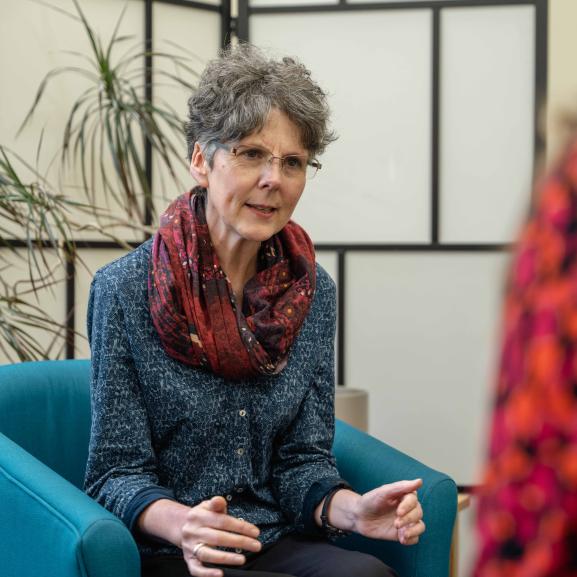Music therapy, a safe space to process feelings, emotions, trauma
Music Therapist Harmin Sijercic describes how music therapy at Freedom from Torture helps people who have survived torture overcome their traumatic experience
What drew you to working as a music therapist? What inspired you to get involved?
I trained as a classical pianist back home, in Bosnia. When the war started in the 90s I was in my final year of music academy. I came to England to flee the war, and I completed my studies here. Being a refugee myself, I feel the need to help other people so that’s why I came to Freedom from Torture, to try and combine the two skills together: My music skills and helping people through music therapy.
What do you think makes music therapy different from other types of therapy?
In music therapy, we use that same language and we are directly connected through the medium of music, and that can be a very powerful experience for clients whereas in other types of therapy people usually work individually.
Being a refugee myself, I feel the need to help other people so that’s why I came to Freedom from Torture, to try and combine the two skills together: My music skills and helping people through music therapy.
What is it about a group that is beneficial for an individual? What does that do?
Engaging in the activity together is crucial to building trust through communication. Furthermore, people are able to share a space in which they’re free to process their feelings, emotions, and feel that they belong to the group. Because a lot of clients we see are very isolated and don’t really have a social network; they are lacking in confidence and being in a group can help them to address some of these issues.
Some of the clients come from places where regimes actively punished people for playing or listening to music. One of my clients was actually arrested in Iran for carrying a guitar: he was playing in a rock band, and that was something that wasn’t accepted as it was seen as too westernised.
Do the different cultures and backgrounds of all your clients come out during sessions?
Yeah, people do like to talk about the instruments that they have seen or heard in their countries. But depending on where they lived, they may not have been exposed to music so much, and that’s really one of the challenges: some of the clients come from places where regimes actively punished people for playing or listening to music. One of my clients was actually arrested in Iran for carrying a guitar: he was playing in a rock band, and that was something that wasn’t accepted as it was seen as too westernised, so he was arrested and prosecuted by the government.
People are able to share a space in which they’re free to process their feelings, emotions, and feel that they belong to the group. Because a lot of clients we see are very isolated and don’t really have a social network; they are lacking in confidence and being in a group can help them to address some of these issues.
But people with such a background can free themselves through music. We all associate music with happy but also very sad memories, but even those are good because music therapy provides a way to process them in a non-verbal way.
Can you think of any moments where you have had a breakthrough in a session? Where someone has come to you and they might not want to talk about something but the music has really helped them to process something that they’re going through?
A lot of clients have told me how playing music helps them. Some of them are able to transform their lives completely. The Iranian client who was punished for playing music stopped playing for years after having had that dramatic experience. When he first came to music therapy, he kept away from the guitar: he played all the other instruments but the guitar, for him the guitar was the object that caused him all the trouble that he had had. It was only after we built a relationship that eventually he decided to go back to the guitar and that was a breakthrough, a catalyst to so many changes in his life: He formed a band, his depression disappeared, he started feeling better about himself and got a place at college. He even became interested in becoming a music producer. That was amazing, how he transformed his life.
They play music and feel like they’re protected from the outside world and the anxieties and worries they have.
How does music therapy empower clients?
They say coming here it’s like a bubble for them. They play music and feel like they’re protected from the outside world and the anxieties and worries they have. They come and say: I want this feeling to be like this all the time and the feeling of being protected that’s created in the music.
Having these positive experiences to go back to helps them when they get depressed or feel overwhelmed.
You must feel very proud of what people have achieved and how they have flourished.
I have facilitated them to access the music and to make changes possible in their lives, so in that sense, I do feel proud to know my contribution enabled these changes in their lives.






